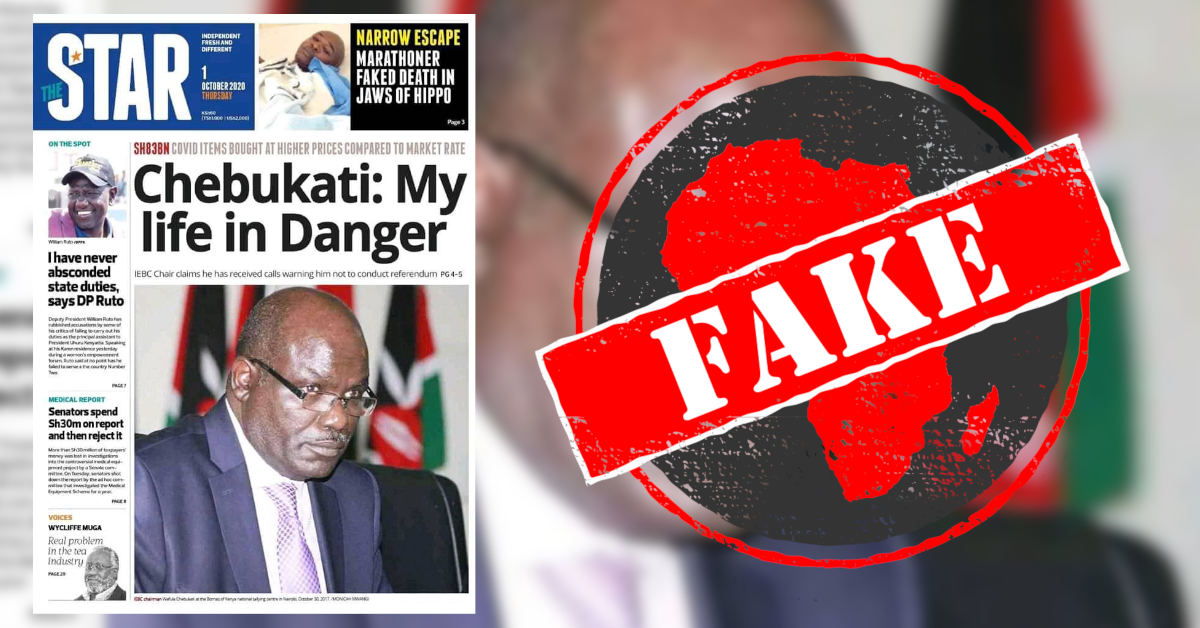“Chebukati: My life in Danger,” reads the headline of what seems to be the front page of the 1 October 2020 edition of the Star, a Kenyan newspaper, shared on Facebook.
It shows a photo of Wafula Chebukati, the chair of Kenya’s Independent Electoral and Boundaries Commission.
“IEBC chair claims he has received calls warning him not to conduct referendum,” text below the headline reads. The front page has been posted on a Facebook group page with thousands of members.
Former prime minister Raila Odinga, the leader of the opposition Orange Democratic Movement party, has been quoted by local media as saying the country and the IEBC should “prepare for a referendum” on amendments to the constitution.
Odinga and president Uhuru Kenyatta are pushing for changes to the constitution through the Building Bridges Initiative report.
The two have said the report should unite Kenyans and end bloodshed during presidential elections, but it has faced fierce criticism from deputy president William Ruto and his allies.
Did the Star newspaper report that Chebukati had received death threats related to the proposed referendum? We checked.

The headline’s careless mix of capital and small letters is a hint that the front page image has been doctored. It is unlikely that a reputable newspaper would deliberately use “Danger” with a capital D in the middle of a sentence.
And the original 1 October 2020 front page of the Star tells a different story. The real headline reads: “Revealed: Why Kemsa bosses are in trouble.” Kemsa is the Kenya Medical Supplies Authority. The summary below adds: “Awarded multi million-shillings tenders to questionable companies.”
The front page photo is not of Chebukati, but of an excavator working on a collapsed building. – Dancan Bwire
It shows a photo of Wafula Chebukati, the chair of Kenya’s Independent Electoral and Boundaries Commission.
“IEBC chair claims he has received calls warning him not to conduct referendum,” text below the headline reads. The front page has been posted on a Facebook group page with thousands of members.
Former prime minister Raila Odinga, the leader of the opposition Orange Democratic Movement party, has been quoted by local media as saying the country and the IEBC should “prepare for a referendum” on amendments to the constitution.
Odinga and president Uhuru Kenyatta are pushing for changes to the constitution through the Building Bridges Initiative report.
The two have said the report should unite Kenyans and end bloodshed during presidential elections, but it has faced fierce criticism from deputy president William Ruto and his allies.
Did the Star newspaper report that Chebukati had received death threats related to the proposed referendum? We checked.

‘Why Kemsa bosses are in trouble’
The headline’s careless mix of capital and small letters is a hint that the front page image has been doctored. It is unlikely that a reputable newspaper would deliberately use “Danger” with a capital D in the middle of a sentence.
And the original 1 October 2020 front page of the Star tells a different story. The real headline reads: “Revealed: Why Kemsa bosses are in trouble.” Kemsa is the Kenya Medical Supplies Authority. The summary below adds: “Awarded multi million-shillings tenders to questionable companies.”
The front page photo is not of Chebukati, but of an excavator working on a collapsed building. – Dancan Bwire
Republish our content for free
For publishers: what to do if your post is rated false
A fact-checker has rated your Facebook or Instagram post as “false”, “altered”, “partly false” or “missing context”. This could have serious consequences. What do you do?
Click on our guide for the steps you should follow.
Publishers guideAfrica Check teams up with Facebook
Africa Check is a partner in Meta's third-party fact-checking programme to help stop the spread of false information on social media.
The content we rate as “false” will be downgraded on Facebook and Instagram. This means fewer people will see it.
You can also help identify false information on Facebook. This guide explains how.


Add new comment